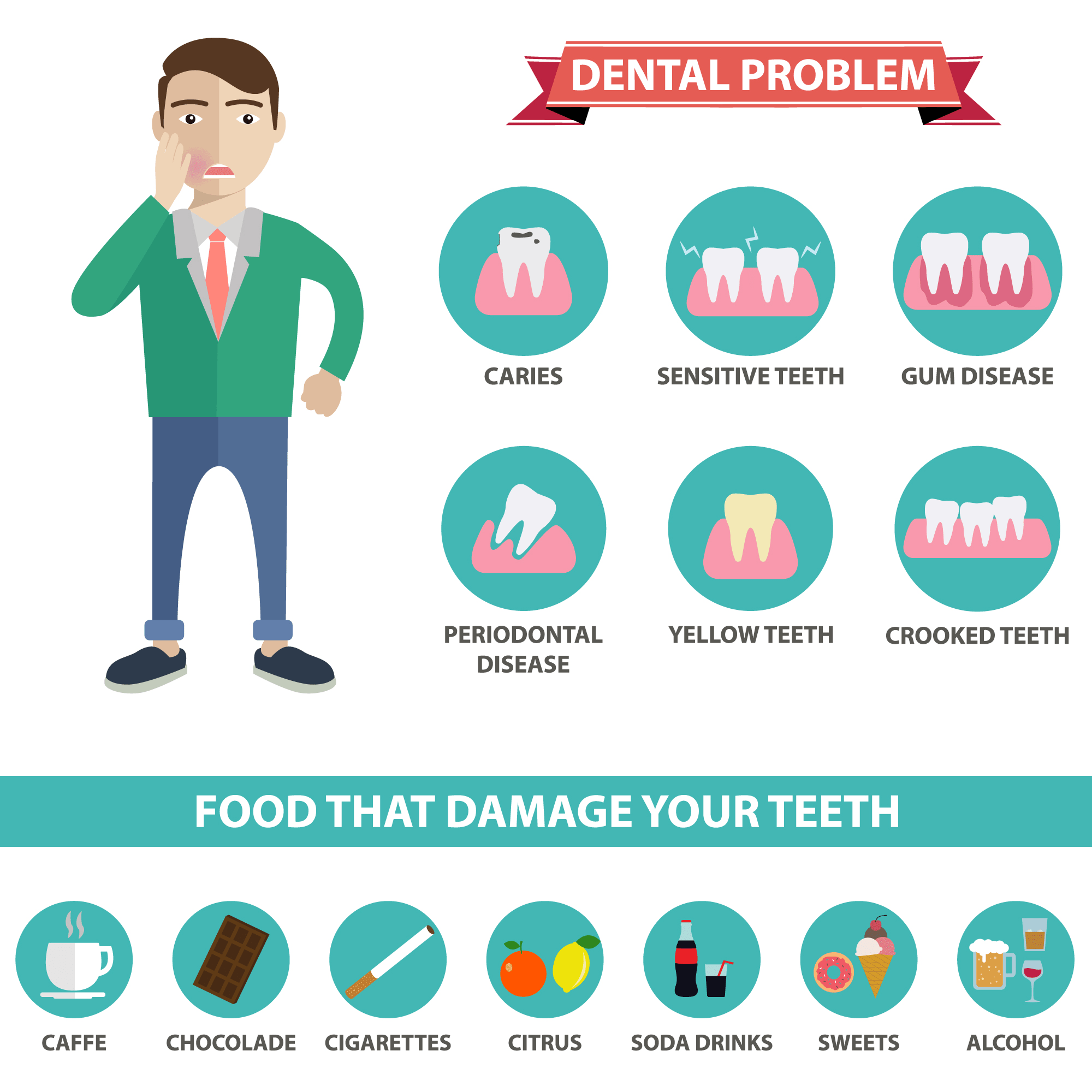
Maintaining optimal oral health is crucial for overall wellbeing, yet millions suffer from preventable dental issues daily. At Vinayak Dental Hospital, we’ve treated over 5,000 patients for common dental problems – many of which could have been avoided with proper care. This comprehensive guide covers:
✔ 8 most prevalent dental issues
✔ Warning signs you shouldn’t ignore
✔ Professional treatment options
✔ Proven prevention strategies
✔ When to visit your dentist
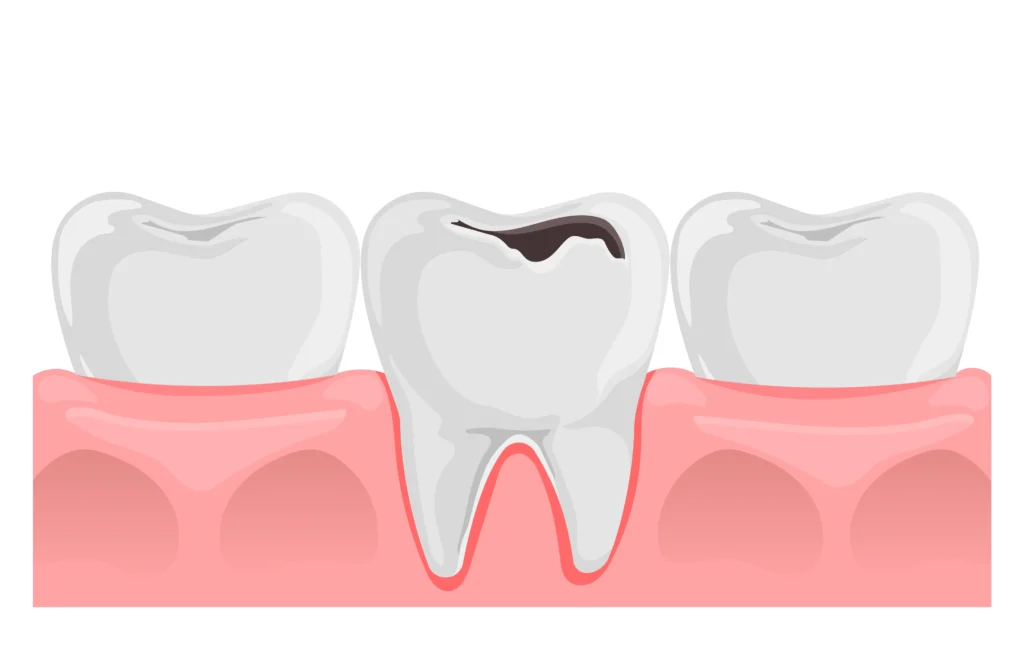
What it is:
Tooth decay, also known as dental caries or cavities, is one of the most widespread dental problems affecting people of all ages. It occurs when bacteria in the mouth produce acids that erode the enamel, leading to holes or cavities in the teeth. Factors contributing to tooth decay include poor oral hygiene, excessive consumption of sugary and acidic foods, and lack of fluoride. Symptoms include tooth sensitivity, pain when consuming hot or cold foods, visible holes or pits in the teeth, and bad breath. Prevention involves maintaining good oral hygiene by brushing twice a day with fluoride toothpaste, flossing daily, and visiting the dentist regularly for professional cleanings. Treatments range from fluoride applications for early-stage decay to fillings, crowns, or root canals for more severe cases. In cases where the tooth is extensively damaged, an extraction followed by a dental implant or bridge may be recommended.
Symptoms:
• Tooth sensitivity
• Visible holes/dark spots
• Pain when chewing
Vinayak Dental Treatment:
• Fluoride treatments for early decay
• Tooth-colored fillings
• CEREC same-day crowns for severe cases
Prevention Tip:
“Limit sugary snacks to mealtimes only – frequent grazing gives bacteria constant fuel.” – Dr. Sharma, Chief Dentist
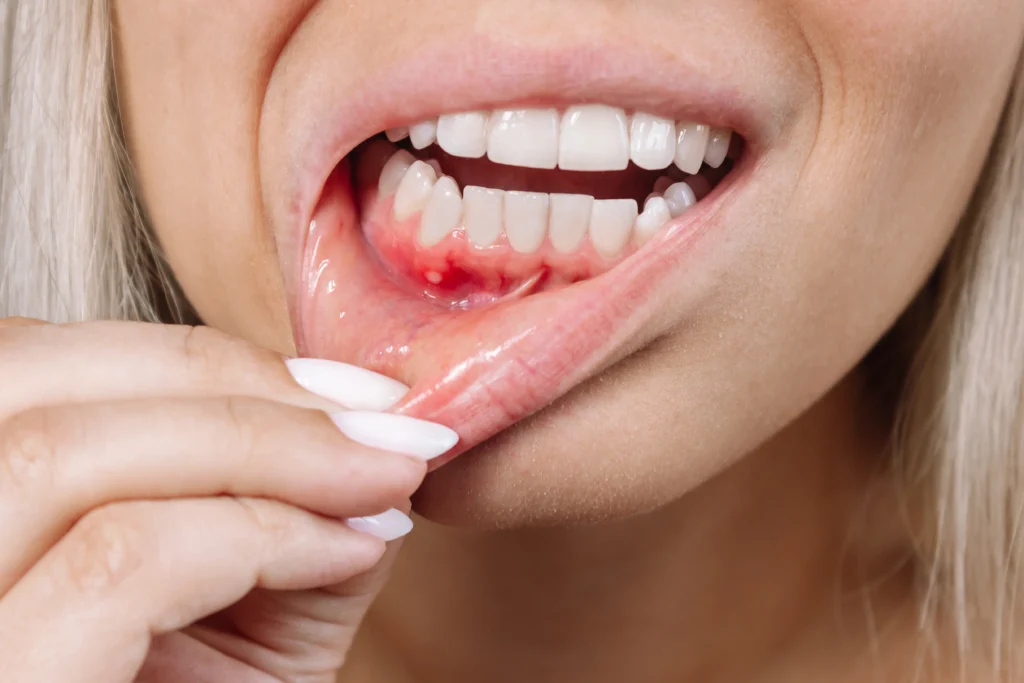
Gum disease, or periodontal disease, is an infection of the gums that can progress to affect the bone supporting the teeth. It begins with gingivitis, characterized by red, swollen gums that bleed easily while brushing or flossing. If untreated, it can advance to periodontitis, leading to gum recession, tooth mobility, and eventual tooth loss. Contributing factors include poor oral hygiene, smoking, diabetes, and genetic predisposition. Symptoms include persistent bad breath, gum recession, painful chewing, and the formation of deep pockets between teeth and gums. Treatment for early-stage gum disease involves professional cleaning and improved oral care, while advanced cases may require deep cleaning (scaling and root planing), antibiotics, or surgical interventions like gum grafts or flap surgery. Preventing gum disease involves regular brushing, flossing, and routine dental visits to monitor gum health.
Stages & Symptoms:
| Stage | Symptoms | Consequences |
|---|---|---|
| Gingivitis | Bleeding gums, bad breath | Reversible with care |
| Periodontitis | Receding gums, loose teeth | Bone loss, tooth loss |
Advanced Treatment at Vinayak:
• Deep cleaning (scaling/root planing)
• Laser gum therapy
• Pinhole surgical technique for recession
Did You Know?
Gum disease increases risk of heart disease by 20% (Journal of Periodontology)
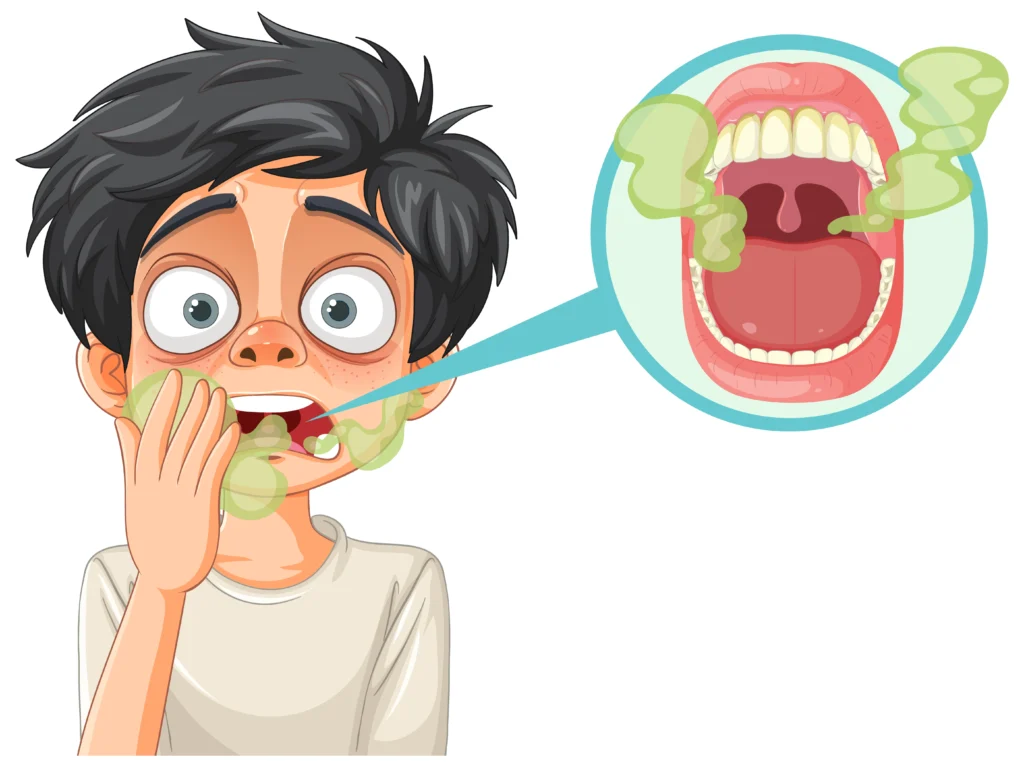
Bad breath, or halitosis, is a common and often embarrassing problem caused by poor oral hygiene, food particles trapped in the mouth, dry mouth, infections, or certain medical conditions. It can also result from consuming strong-smelling foods like garlic and onions. The best way to prevent bad breath is by maintaining good oral hygiene, staying hydrated, and visiting the dentist regularly for checkups and cleanings. In cases where bad breath is persistent, it may be a sign of an underlying health issue that requires medical attention.
Common Causes:
✓ Tongue bacteria (90% of cases)
✓ Gum disease
✓ Dry mouth
Our Halitosis Clinic Offers:
• OralDNA testing to identify bacteria
• Professional tongue cleaning
• Custom treatment plans
Home Test:
Scrape back of tongue with spoon – foul smell indicates bacterial buildup
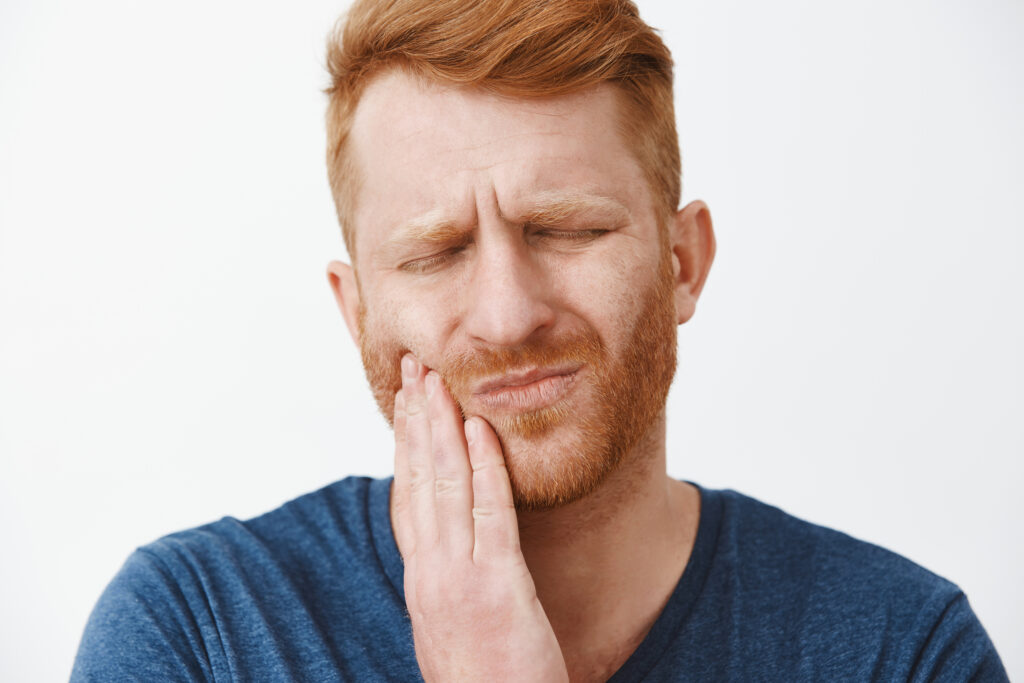
Tooth sensitivity occurs when the enamel protecting the teeth wears down, exposing the underlying dentin and nerve endings. This condition causes discomfort or pain when consuming hot, cold, or sweet foods and beverages. Common causes include enamel erosion, gum recession, cavities, and worn-out dental fillings. Managing tooth sensitivity involves using desensitizing toothpaste, fluoride treatments, and avoiding acidic foods. In severe cases, treatments such as bonding, gum grafts, or root canals may be necessary.
Why It Happens:
→ Exposed dentin from receding gums
→ Enamel erosion
→ Cracked teeth
Vinayak’s Solutions:
• Desensitizing treatments
• Gum grafts for recession
• Night guards for grinders
Product Recommendation:
Use soft-bristled toothbrushes & sensitivity toothpaste containing potassium nitrate
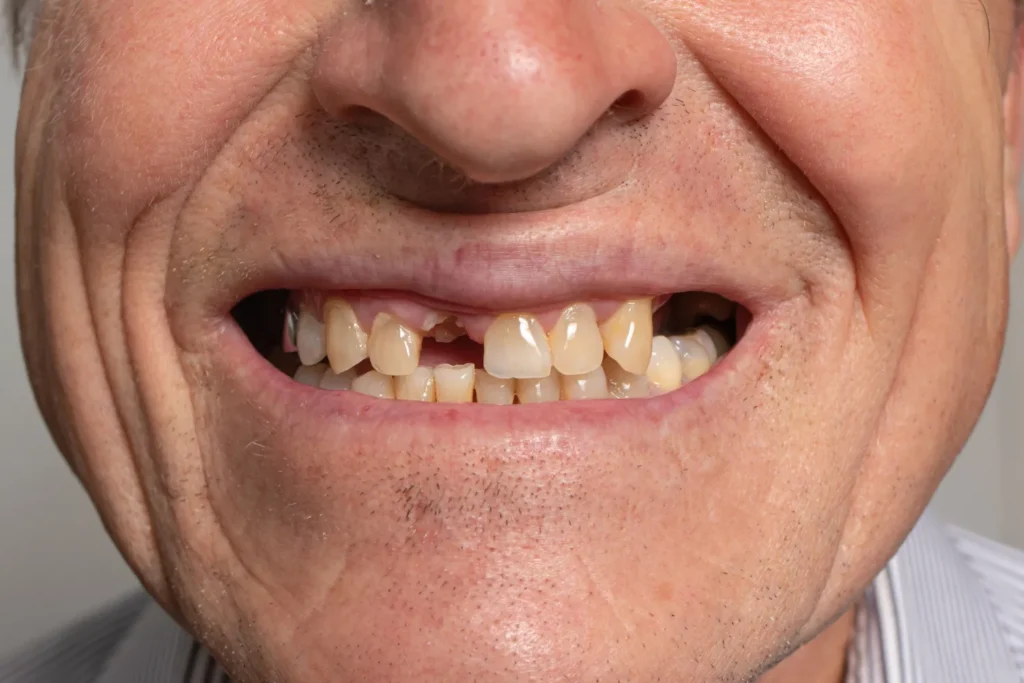
Cracked or broken teeth can occur due to trauma, biting hard objects, grinding teeth, or weakened enamel. Depending on the severity, symptoms can range from minor discomfort to intense pain when chewing or exposing the tooth to temperature changes. Treatments include bonding, dental crowns, or veneers for minor cracks, while root canals or extractions may be necessary for severe fractures. Wearing a mouthguard while playing sports and avoiding hard foods can help prevent tooth fractures.
Emergency Protocol:
Restoration Options:
• Dental bonding (for small chips)
• Veneers (front teeth)
• Crowns (molars)

Oral cancer is a serious and potentially life-threatening condition that can develop in any part of the mouth, including the lips, tongue, cheeks, and throat. Risk factors include smoking, excessive alcohol consumption, HPV infection, and prolonged sun exposure. Symptoms include persistent mouth sores, unexplained bleeding, difficulty swallowing, and lumps in the mouth or neck. Early detection through regular dental checkups increases the chances of successful treatment. Treatment options include surgery, radiation therapy, and chemotherapy.
Early Warning Signs:
✓ Non-healing mouth ulcers
✓ White/red patches
✓ Unexplained numbness
Vinayak’s Screening Process:
• VELscope fluorescent imaging
• Brush biopsy for suspicious areas
• Referral network with oncologists
Risk Factors:
Tobacco + alcohol users have 15x higher risk (Oral Cancer Foundation)

Bruxism is the habit of grinding or clenching teeth, often during sleep, which can cause jaw pain, headaches, tooth wear, and fractures. Stress, misaligned teeth, or sleep disorders are common triggers. Treatment includes wearing a custom mouthguard, stress management techniques, and orthodontic adjustments if needed.
Our Custom Solutions:
• Digital bite analysis
• 3D-printed night guards
• Botox for muscle relaxation (severe cases)
Daytime Tips:
• Avoid chewing pens/pencils
• Practice jaw relaxation exercises
• Reduce caffeine intake

Dry mouth (xerostomia) results from reduced saliva production and can lead to difficulties in chewing, swallowing, and speaking. It also increases the risk of cavities and gum disease. Causes include medications, dehydration, smoking, and medical conditions like diabetes. Drinking plenty of water, using saliva substitutes, and maintaining good oral hygiene can help manage dry mouth. In severe cases, medications to stimulate saliva production may be prescribed.
Common Causes:
• Medications (500+ drugs cause it)
• Diabetes
• Radiation therapy
Vinayak’s Relief Protocol:
• Saliva substitutes
• Prescription fluoride
• Electro-stimulation devices
Daily Must-Dos:
Professional Care Schedule:
• Cleanings: Every 6 months
• X-rays: Annual
• Oral cancer screening: After 30
At Vinayak Dental Hospital, we are committed to providing top-tier dental care with cutting-edge technology and a patient-centric approach. Here’s why thousands trust us with their smiles:
✔ Pain-Free Philosophy – We use advanced anesthesia techniques and laser dentistry to ensure a comfortable, pain-free experience.
✔ State-of-the-Art Technology – From CBCT scans to digital impressions, our latest equipment ensures precise diagnostics and treatment.
✔ Multispecialty Expertise – Our team of experienced dentists specializes in periodontics, orthodontics, cosmetic dentistry, and more—all under one roof.
✔ Personalized Treatment Plans – Every patient receives a customized care plan based on their unique dental needs.
✔ Emergency Dental Care – Our 24/7 emergency helpline ensures immediate assistance in case of dental trauma or severe pain.
🆘 Uncontrolled bleeding
🆘 Swelling affecting breathing
🆘 Trauma causing tooth displacement
24/7 Emergency Contact: 9414035509
Q: How often should I replace my toothbrush?
A: Every 3 months or after illness
Q: Are electric toothbrushes better?
A: Yes – removes 21% more plaque (ADA studies)
Q: Is flossing really necessary?
A: Critical – cleans 40% of tooth surfaces brushing misses
Taking care of your oral health is essential for overall well-being. By recognizing the signs of common dental problems and seeking professional care, you can maintain strong, healthy teeth for life. At Vinayak Dental Hospital, we provide expert dental care using the latest technology to ensure painless and effective treatments. Book an appointment today for a healthier smile!
📞 Book a FREE Consultation Today: 9414035509
📍 Location: Behind poonam talkies, mariyara wale, dausa, 303303
📧 Email: info@vinayakdentalhospital.com
🌐 Website: Vinayak Dental Hospital